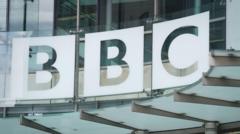The BBC denies claims made by the White House regarding inaccuracies in its coverage of the Gaza situation, reaffirming its commitment to factual reporting.
BBC Defends Its Gaza Coverage Against White House Mischaracterizations

BBC Defends Its Gaza Coverage Against White House Mischaracterizations
The BBC stands firm in response to the White House's criticism regarding its reporting on Gaza, asserting the integrity of its journalism.
The BBC has firmly rejected the White House's recent criticism of its coverage regarding casualties in Gaza, labeling the assertions as "completely wrong." During a briefing led by Press Secretary Karoline Leavitt, claims emerged that the BBC had adopted "the word of Hamas" concerning the death toll from a shooting near an aid distribution site on Sunday. Additionally, Leavitt alleged that the organization had retracted a story, a statement the BBC promptly refuted.
“The claim that we took down a story after reviewing footage is completely wrong,” the BBC declared in a statement, emphasizing its commitment to reliable journalism. The organization clarified that it had merely updated its coverage to reflect the evolving situation, a standard practice in reporting fast-developing incidents.
The BBC's coverage had initially reported a death toll of 15 based on medic claims, which later updated to figures of 31 from the health ministry and subsequently to "at least 21" according to the Red Cross. Various reports emerged about the incident in Rafah, with civilian witnesses and NGOs asserting that individuals were shot while queuing for food, while the Israeli military denied these accounts, calling them false.
Discussion around the incident escalated as local officials reported that Israeli forces had fired on civilians trying to collect aid, resulting in at least 27 fatalities in a separate occurrence. The Israeli Defense Forces countered that their troops acted upon identifying individuals deviating from designated access routes.
Leavitt also criticized the BBC for removing a story due to alleged lack of evidence, referring to a BBC Verify report fact-checking a viral video. The BBC clarified that while it found the video was not related to the aid distribution center, it had not aired on its news channels nor influenced its reporting, stating that "conflating these two stories is simply misleading."
In conclusion, the BBC reiterated the challenges faced by international journalists due to restrictions preventing entry into Gaza, urging the White House to support immediate access for reporters to convey the complex realities on the ground. With the ongoing conflict following Israel’s military action in response to a Hamas attack that left significant casualties, accurate reporting remains crucial for international understanding.
“The claim that we took down a story after reviewing footage is completely wrong,” the BBC declared in a statement, emphasizing its commitment to reliable journalism. The organization clarified that it had merely updated its coverage to reflect the evolving situation, a standard practice in reporting fast-developing incidents.
The BBC's coverage had initially reported a death toll of 15 based on medic claims, which later updated to figures of 31 from the health ministry and subsequently to "at least 21" according to the Red Cross. Various reports emerged about the incident in Rafah, with civilian witnesses and NGOs asserting that individuals were shot while queuing for food, while the Israeli military denied these accounts, calling them false.
Discussion around the incident escalated as local officials reported that Israeli forces had fired on civilians trying to collect aid, resulting in at least 27 fatalities in a separate occurrence. The Israeli Defense Forces countered that their troops acted upon identifying individuals deviating from designated access routes.
Leavitt also criticized the BBC for removing a story due to alleged lack of evidence, referring to a BBC Verify report fact-checking a viral video. The BBC clarified that while it found the video was not related to the aid distribution center, it had not aired on its news channels nor influenced its reporting, stating that "conflating these two stories is simply misleading."
In conclusion, the BBC reiterated the challenges faced by international journalists due to restrictions preventing entry into Gaza, urging the White House to support immediate access for reporters to convey the complex realities on the ground. With the ongoing conflict following Israel’s military action in response to a Hamas attack that left significant casualties, accurate reporting remains crucial for international understanding.





















